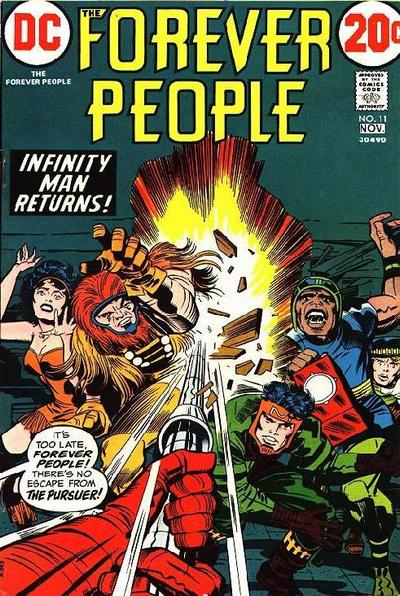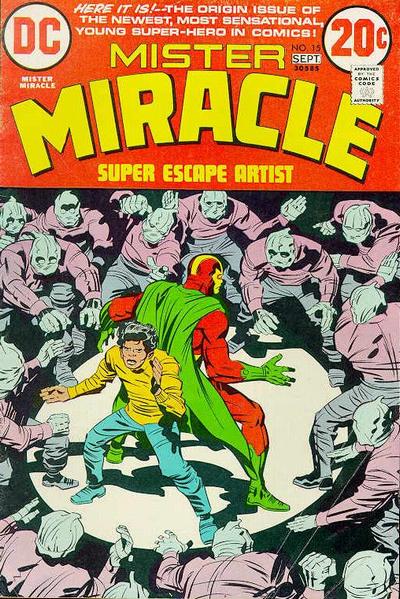The great tragedy of Jack Kirby's Fourth World is that it never became what he imagined it to be and that it was brought to a screeching halt before he could complete even what was likely the first phase. Kirby imagined, perhaps naively, that he would be the centerpiece of a gang of talented artists like Don Heck and John Romita (both of whom he asked to join him) and launch not only a gaggle of new concepts, but oversee new formats as well. Kirby imagined collected editions of comics and larger sizes done in a higher quality fit for regular bookstores. He recognized that the comic book was a limited option for graphic storytelling, weighed down by decades of low expectations. Audiences didn't expect to find literature in comic books, they expected to find fun trash. But Kirby had proven at Marvel in conjunction with Stan Lee that comics could be more than that. With his shift to DC and his elevation to editor, he wanted to have another go at it and get proper payment and proper recognition for the work.
The Lee-Kirby debate for me hinges on one evident fact. Measure what Stan Lee created after Jack Kirby left Marvel with what Kirby himself created on his own. There's no comparison. Within a year Stan did what he'd planned to do before in tandem with Kirby, Ditko and others he'd fashioned a new kind of comic book experience, he left comic book writing for the most part. Stan Lee was doubtless a more accomplished and skilled writer than either Jack or Steve, but when it comes to actual creativity he withers in the shadow of his old partner despite the modern mythology to the contrary. Kirby helped create a vivid alternate universe at Marvel that has produced countless graphic stories in an array of formats and has been the spur for television shows and movies of great success. Apart from Stan and Marvel he created a whole new world, several in fact. And eventually the Fourth World was completely integrated into the DC Universe.
At the time the sales of the Fourth World books was likely hampered by the switch of all DC books from fifteen cents to twenty-five cents with added reprints and extra pages for the additional dime. At first Marvel did a similar thing, but then whipped back to twenty cents and ripped the rug out form under DC which had for decades been the number one comics sales leader. And add to that, the fact that Marvel was actually publishing more Kirby work than DC with their avalanche of reprint comics. Kirby was battling against the economy, his old company, and himself. The actual sales numbers of the Fourth World books have long been debated and we'll never know the truth. For my part, I found the quarter books to be great values and I generally love this era of DC with lots of different formats. But I was clearly in the minority.
In this second Absolute Edition of the Fourth World we will see his work on Jimmy Olsen sputter to a halt. And we will see both the Forever People and the New Gods stop abruptly, the stories left hanging in no small way. Mister Miracle will soldier on, but only in a limited way, suddenly ripped away from its companions. Instead of large concepts we get a series of small stories before an obligatory finale. Kirby would finish out his DC contract with new things like Kamandi, the Last Boy on Earth, The Demon, The Losers and OMAC One Man Army Corp, among others such short stints on Justice Inc., Richard Dragon Kung-Fu Fighter, Atlas, Dingbats of Danger Street, Manhunter and The Sandman where he got to work briefly with old partner Joe Simon.
Then he shifted back to Marvel where Stan had been gone for some years as a daily presence and produced The Eternals, Machine Man, Devil Dinosaur, as well as sizeable stints on both Captain Ameria and The Black Panther. Stan and Jack did work together on a Silver Surfer graphic novel. By the end of that contract, he turned his attention to animation where he found greater remuneration. Later he'd help jump start the Independent market with books like Destroyer Duck (more on him at a later date) Silver Star, and Captain Victory and Galactic Rangers.
His ability to draw was beginning to be hampered by his weakening eyesight, but when DC contacted him over a decade after his leaving it behind to revisit his Fourth World vison, he saddled up once again. Kirby had already been cobbling together a vague ending to the Fourth World in Captain Victory, but here was a chance to work once again with original characters. But time had moved. He fashioned an ending of sorts for the saga, far less than originally conceived (if an ending had been imagined at all) but an ending nonetheless. It was better than nothing. But those of us who adore the Fourth World have now lived decades imagining what it might have been, what it could have become if only...
Here are the covers of the work in this mammoth volume.
Kirby was able to give a tiny finale of sorts in his final issue of Mister Miracle which saw many of the Fourth World characters for the last time in that decade under his hand. They would be revived by Gerry Conway and company almost as soon as Kirby left DC for Marvel. Years later a new DC regime welcomed Kirby back to create a more fitting ending to the saga, but from the beginning there were problems.
The Hunger Dogs is Jack Kirby's official finish to the Fourth World saga, but due to technical communications about format and Kirby's diminished eyesight, it's a bit of a muddle. At least there was some vindication to see other formats actually being used on the story as he'd wanted to do many years before.
The Fourth World ideas have become core to the DC Universe, in particular the master villain Darkseid. Darkseid is Kirby's best villain, most real and most fantastic at the same time. He might be Kirby's best character, but I won't get into that fight. So I've read the Fourth World once again and hopefully I'll get the chance to read it several more times before I shuffle off this mortal coil. It still works, Kirby's interrupted masterpiece.
Rip Off





.jpg)


































Jack was full of ideas, and to a lesser extent, so was Steve Ditko. They had to be; it was, after all, the means by which they made their living and paid their bills. It's interesting to note, however, that without Stan Lee, those ideas were never as entertainingly realised in comicbook form as what both artists (Jack & Steve) did at Marvel. There came a point at which Stan never had to create anything else (if, to play devil's advocate for a moment, he ever had) so it's perhaps a little unfair to compare Stan's 'creative output' to Jack & Steve's after they left Marvel. For myself, although competently and professionally produced, I never found anything that both artists did without Stan to be anywhere near as good a read as their earlier work WITH him. Jack & Steve produced rocks, but it was Stan who cut and polished them and turned them into diamonds. Yes, it's a shame that Kirby & Ditko never achieved the same kind of public recognition and financial rewards as Lee, but it's equally as disappointing that both artists never seemed able to realise just what it was that Stan brought to the table and from which their work ultimately benefitted. Without Stan, the usual impressive art (at least to begin with), but WITH Stan, timeless classics that still resonate to this day.
ReplyDeleteThey do indeed resonate. I'm planning a big Marvel read for early next year, so I'm eager to dive into those wonders yet again. I'd only add that the Fourth World resonates for me as well, the themes which speak to modern society are at once elegant and alarming.
DeleteThe first four covers you posted were my introduction to the Fourth World when they came out. I was floored by them, intensely curious about the issues I'd missed, and finally sadden when they were cut short. Decades would pass before I finally got to read those missed early issues, and they made me all the sadder to realize what might have been. Yet I return to the Fourth World on a regular basis for is breadth, depth, and sheer power & imagination. So glad you're highlighting it!
ReplyDeleteI can remember when DC didn't think anyone would want these comics. I could pick up the whole sets of these titles for tiny money and did so a few times for friends. When they finally reprinted them in 1998 tentatively in black and white the response was immediate and powerful. They've been reprinted by my count at least four times since in all kinds of formats, exactly and precisely what Jack wanted.
Delete